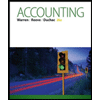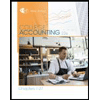
Concept explainers
(1) and (2)
To journalize: The
(1) and (2)
Explanation of Solution
Debit and credit rules:
- Debit an increase in asset account, increase in expense account, decrease in liability account, and decrease in
stockholders’ equity accounts. - Credit decrease in asset account, increase in revenue account, increase in liability account, and increase in stockholders’ equity accounts.
Record the transactions for Incorporation NE.
| Date | Account Titles and Explanation | Debit ($) | Credit ($) | ||
| 20Y1 | |||||
| January | 15 | Cash Dividends Payable | 34,320 | ||
| Cash | 34,320 | ||||
| (To record the payment of cash dividends) | |||||
| March | 15 |
Cash
| 324,000 | ||
| | 288,000 | ||||
| Paid-in capital from treasury stock
| 36,000 | ||||
| (To record sale of treasury stock for above the cost price of $6 per share) | |||||
| April | 13 |
Cash | 1,600,000 | ||
| Common Stock
| 1,000,000 | ||||
| Paid-in Capital in Excess of stated value Common Stock
| 600,000 | ||||
| (To record issuance of 200,000 shares in excess of stated value) | |||||
| June | 14 | Stock Dividends | 184,500 | ||
| Common Stock Dividends Distributable | 123,000 | ||||
| Paid-in Capital in excess of Stated Value-Common stock | 61,500 | ||||
| (To record the declaration of stock dividends) | |||||
| July | 16 | Common Stock Dividends Distributable | 123,000 | ||
| Common Stock | 123,000 | ||||
| (To record the distribution of stock dividends) | |||||
| October | 30 |
Treasury stock
| 300,000 | ||
| Cash | 300,000 | ||||
| (To record the purchase of 50,000 shares of treasury stock) | |||||
| December | 30 | Cash Dividends | 63,568 | ||
| Cash Dividends Payable | 63,568 | ||||
| (To record the declaration of cash dividends) | |||||
| December | 31 | Income summary | 775,000 | ||
| 775,000 | |||||
| (To close the income summary account) | |||||
| December | 31 | Retained Earnings | 248,068 | ||
| Stock dividends | 184,500 | ||||
| Cash Dividends | 63,568 | ||||
| (To record the closing of stock dividends and cash dividends to retained earnings account) | |||||
Table (1)
Working note:
Calculate treasury stock cost per share.
Compute number of shares outstanding after the issuance of common stock on April 13.
Compute the stock dividends shares.
Compute the stock dividends amount payable to common stockholders.
Compute common stock dividends distributable value.
Compute paid-in capital in excess of par value-common stock.
Compute number of shares outstanding as on December 30.
Calculate the amount of cash dividend declared on December 28.
Enter the beginning balance and post the transactions into the stockholders’ equity accounts for Incorporation NE.
Common stock account is a component of stockholder’s equity with a normal credit balance.
| Common stock | |||||
| Date | Particulars | Debit | Date | Particulars | Credit |
| January 1 | Balance | $3,100,000 | |||
| April 13 | Cash | $1,000,000 | |||
| July 16 | Stock dividends distributable | $123,000 | |||
| Total | $ 0 | Total | 4,223,000 | ||
| December 31 | Balance | $4,223,000 | |||
Table (2)
Paid-in capital in excess of stated value - Common stock account is a component of stockholder’s equity with a normal credit balance.
| Paid-in capital in excess of stated value - Common stock | |||||
| Date | Particulars | Debit | Date | Particulars | Credit |
| January 1 | Balance | $1,240,000 | |||
| April 13 | Cash | $600,000 | |||
| June 14 | Stock dividends | $61,500 | |||
| Total | $ 0 | Total | $ 1,901,500 | ||
| December 31 | Balance | $ 1,901,500 | |||
Table (3)
Retained earnings are a component of stockholder’s equity with a normal credit balance.
| Retained earnings | |||||
| Date | Particulars | Debit | Date | Particulars | Credit |
| December 31 | Cash and stock dividends | $248,068 | January 1 | Balance | $4,875,000 |
| December 31 | Income summary | $775,000 | |||
| Total | $248,068 | Total | $5,650,000 | ||
| December 31 | Balance | $5,401,932 | |||
Table (4)
Treasury stock is a component of stockholder’s equity with a normal debit balance.
| Treasury stock | |||||
| Date | Particulars | Debit | Date | Particulars | Credit |
| January 1 | Balance | $288,000 | March 15 | Cash | $288,000 |
| October 30 | Cash | $300,000 | |||
| Total | $ 588,000 | Total | $288,000 | ||
| December 31 | Balance | $ 300,000 | |||
Table (5)
Paid-in capital from treasury stock is a component of stockholder’s equity with a normal credit balance.
| Paid-in capital from treasury stock | |||||
| Date | Particulars | Debit | Date | Particulars | Credit |
| March 15 | Cash | $36,000 | |||
| Total | $ 0 | Total | $36,000 | ||
| December 31 | Balance | $36,000 | |||
Table (6)
Stock dividend distributable is a contra stockholder’s equity with a normal credit balance.
| Stock dividend distributable | |||||
| Date | Particulars | Debit | Date | Particulars | Credit |
| July 16 | Common stock | $123,000 | June 14 | Stock dividend | $123,000 |
| Total | $123,000 | Total | $123,000 | ||
| December 31 | Balance | $0 | |||
Table (7)
Stock dividend is a component of stockholder’s equity with a normal debit balance.
| Stock dividend | |||||
| Date | Particulars | Debit | Date | Particulars | Credit |
| June 14 | Stock dividend distributable | $123,000 | December 31 | Retained earnings | $184,500 |
| July 5 | Paid in capital in excess of stated value –Common value | $61,500 | |||
| Total | $184,500 | Total | $184,500 | ||
| December 31 | Balance | $0 | |||
Table (8)
Cash dividend is a component of stockholder’s equity with a normal debit balance.
| Stock dividend | |||||
| Date | Particulars | Debit | Date | Particulars | Credit |
| December 30 | Cash dividend payable | $63,568 | December 31 | Retained earnings | $63,568 |
| Total | $63,568 | Total | $63,568 | ||
| December 31 | Balance | $0 | |||
Table (9)
(3)
To prepare: Statement of stockholders’ equity the year ended December 31, 20Y1.
(3)
Explanation of Solution
Statement of stockholders’ equity: The statement which reports the changes in stock, paid-in capital, retained earnings, and treasury stock, during the year is referred to as statement of stockholders’ equity.
Prepare a statement of stockholders’ equity for the year ended December 31, 20Y1.
| Incorporation NE | |||||
| Statement of Stockholders’ Equity | |||||
| For the Year Ended December 31, 20Y1 | |||||
| Common Stock | Additional Paid-in Capital | Retained Earnings | Treasury Stock | Total | |
| Balances, January 1, 20Y1 | $3,100,000 | $1,240,000 | $4,875,000 | (288,000) | $8,927,000 |
| Net income | 775,000 | 775,000 | |||
| Dividends on stock | 123,000 | 61,500 | (184,500) | 0 | |
| Cash dividends | (63,568) | (63,568) | |||
| Paid-in capital from treasury stock | 36,000 | 288,000 | 324,000 | ||
| Sale of treasury stock | (300,000) | (300,000) | |||
| Issuance of additional stock | 1,000,000 | 600,000 | 1,600,000 | ||
| Balances, December 31, 20Y1 | $4,223,000 | $1,937,500 | $5,401,932 | $(300,000) | $11,262,432 |
Table (10)
(4)
To prepare: The stockholders’ equity section of the December 31, 20Y1, balance sheet.
(4)
Explanation of Solution
Stockholders’ equity: It refers to the amount of capital that includes the amount of investment by the stockholders, earnings generated from the normal business operations, and less any dividends paid to the stockholders.
Prepare the stockholders’ equity section of the December 31, 20Y1, balance sheet.
| Incorporation NE | |||
| Partial Balance Sheet | |||
| December 31, 20Y1 | |||
| Stockholders' Equity | Amount | Amount | Amount |
| Paid-in capital: | |||
| Common stock, $5 stated (900,000 shares authorized; 620,000 shares issued, 794,600 shares outstanding) | $4,223,000 | ||
| Excess over stated value | $1,901,500 | ||
| Paid-in capital, common stock | $6,124,500 | ||
| From sale of treasury stock | $36,000 | ||
| Total paid-in capital | $6,160,000 | ||
| Retained earnings | $5,401,932 | ||
| Total | $11,562,432 | ||
| Treasury common stock (50,000 shares at cost) | $(300,000) | ||
| Total stockholders' equity | $11,262,432 | ||
Table (11)
Want to see more full solutions like this?
Chapter 12 Solutions
CORPORATE FINANCIAL ACCOUNTING 15TH ED
- Total factory Overhead costs would bearrow_forwardCalculate the ending balance of accounts receivablearrow_forwardBrightstar Financial Services recorded several financial transactions during the period. The company received $38,500 in cash from credit customers and allowed $3,200 in sales discounts. Additionally, $2,100 in bad debts were written off. Given that the beginning balance of Accounts Receivable was $92,000, calculate the ending balance of Accounts Receivable. Helparrow_forward
- DuraWeave Textile Mill processes raw cotton into premium cleaned cotton. The raw cotton costs $6.50 per pound, but during the cleaning process, there is a 40% loss due to impurities and waste. After cleaning, the processing cost is $9.75 per pound of cleaned cotton. Additionally, a quality bonus of 12% is applied to the final cost of the cleaned cotton. Calculate the total cost of processing 250 pounds of raw cotton.arrow_forwardWhat distinguishes capacity utilization accounting from volume measures? A. Standard measures work fine B. Resource availability impacts supplement usage records C. Capacity remains constant D. Usage numbers tell everything MCQarrow_forwardI need help finding the accurate solution to this general accounting problem with valid methods.arrow_forward
 Financial AccountingAccountingISBN:9781337272124Author:Carl Warren, James M. Reeve, Jonathan DuchacPublisher:Cengage Learning
Financial AccountingAccountingISBN:9781337272124Author:Carl Warren, James M. Reeve, Jonathan DuchacPublisher:Cengage Learning Survey of Accounting (Accounting I)AccountingISBN:9781305961883Author:Carl WarrenPublisher:Cengage Learning
Survey of Accounting (Accounting I)AccountingISBN:9781305961883Author:Carl WarrenPublisher:Cengage Learning Financial And Managerial AccountingAccountingISBN:9781337902663Author:WARREN, Carl S.Publisher:Cengage Learning,
Financial And Managerial AccountingAccountingISBN:9781337902663Author:WARREN, Carl S.Publisher:Cengage Learning, Accounting (Text Only)AccountingISBN:9781285743615Author:Carl Warren, James M. Reeve, Jonathan DuchacPublisher:Cengage Learning
Accounting (Text Only)AccountingISBN:9781285743615Author:Carl Warren, James M. Reeve, Jonathan DuchacPublisher:Cengage Learning Financial AccountingAccountingISBN:9781305088436Author:Carl Warren, Jim Reeve, Jonathan DuchacPublisher:Cengage Learning
Financial AccountingAccountingISBN:9781305088436Author:Carl Warren, Jim Reeve, Jonathan DuchacPublisher:Cengage Learning College Accounting, Chapters 1-27 (New in Account...AccountingISBN:9781305666160Author:James A. Heintz, Robert W. ParryPublisher:Cengage Learning
College Accounting, Chapters 1-27 (New in Account...AccountingISBN:9781305666160Author:James A. Heintz, Robert W. ParryPublisher:Cengage Learning





